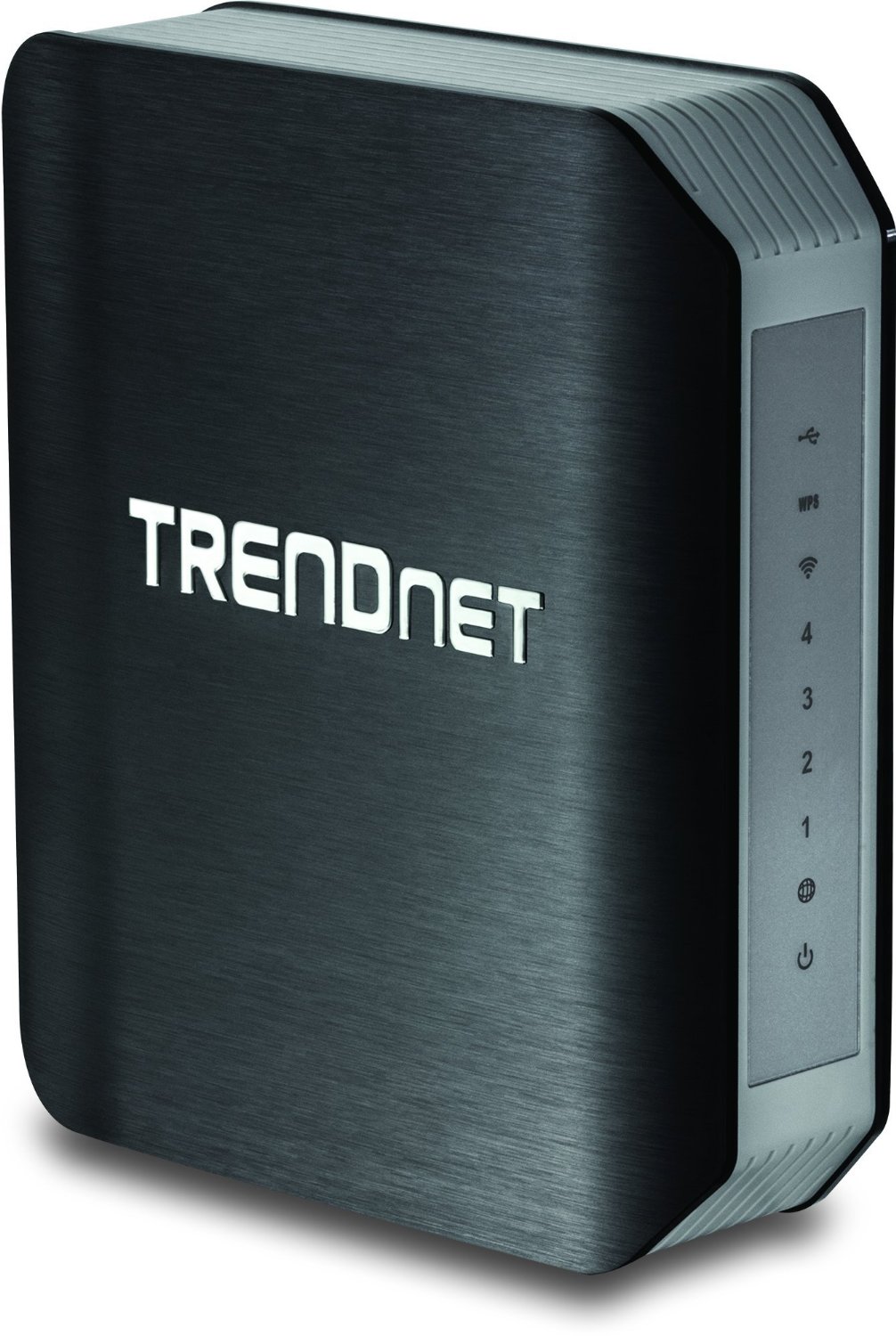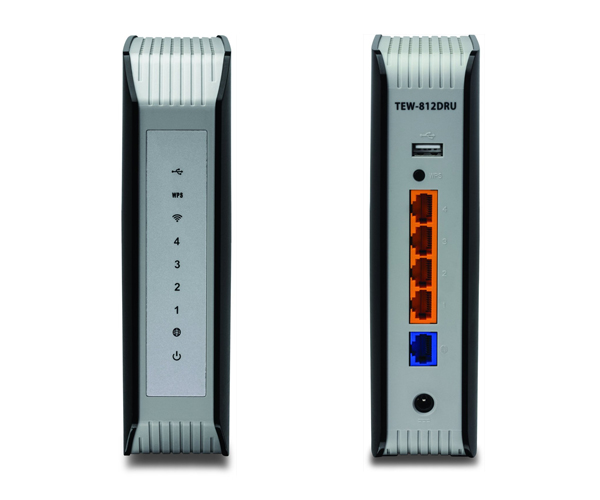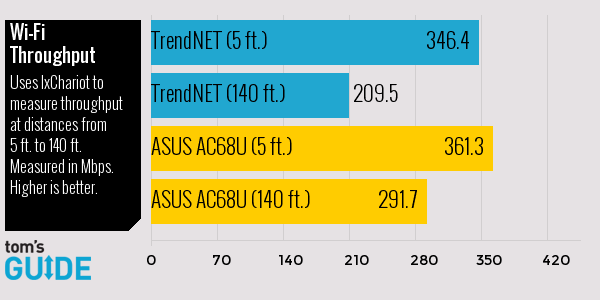Tom's Guide Verdict
The Trendnet TEW-812 802.11ac delivers excellent dual-band performance on the cheap and is easy to hide, but it falls a bit short on range.
Pros
- +
Inexpensive
- +
Small design sans unsightly antennas
- +
Impressive security features
- +
Online firmware simulator
- +
Three-year warranty
Cons
- -
Short range
Why you can trust Tom's Guide
While it may not be the fastest router around, Trendnet’s TEW-812DRU is for those who want an inexpensive 802.11ac router that can unobtrusively fit into a home’s decor. And, at $120, its price makes it all the more attractive for those looking for a solid midrange router.
Design
The beauty of Trendnet’s dual-band TEW-812DRU router is that it should be able to unobtrusively meld into any decor. At 7.0 x 3.6 x 1.9 inches, the black router has gray edging and is roughly the size of a hardbound book. Unlike most of its peers, the router has no external antennas to get in the way, so it’s easy to slip it onto a shelf among books and bric-a-brac. In fact, few will even notice it.

Along the front, the router has nine LEDs that show whether it’s turned on and connected to the Internet, and the activity on the system’s 2.4- and 5-GHz Wi-Fi channels as well as its ports. Unlike Netgear’s R8000, you can’t turn the 812DRU’s lights off with a simple switch.

The router has four wired gigabit Ethernet ports along with a USB 3.0 connector for using a networked hard drive or printer. That’s one USB port short of the Linksys WRT1900AC and the Netgear R8000, and it does without an e-SATA port for directly connecting a hard drive. Underneath is a reset button for wiping the router’s settings.
Setup
The included CD contains a Quick Installation Guide as well as a full User’s Guide and software to install a printer; the software is on Trendnet’s website.
MORE: Router Reviews
All told, setting up the 812DRU takes a few minutes and requires little or no networking knowledge. The device comes with a unique network name as well as an encryption passcode and password for gaining access to the 812DRU’s settings. It’s all printed on a sticker under the router, so it’s a good idea to change these settings.
After the router is plugged into your home broadband modem and powered up, point a browser window to “tew-812dru” or its host address (192.168.10.1) and log in. You can set it up manually or allow Trendnet’s Internet Connection.
Once set up, clients can connect manually or use the router’s Wi-Fi Protected Setup (WPS) protocol. The router linked with tablets, desktops, notebooks, printers and phones without a problem.

With a network address translation (NAT) feature and a stateful packet inspection (SPI) firewall, the 812DRU is about as secure as a home router gets. You can keep clients from logging on, block objectionable websites and set up a weekly schedule for who has access — a valuable tool in parenting these days. You can also create a Guest network with the router that allows only online access. You also have the choice of allowing access to the connected hard drives or not..
The 812DRU uses WEP, WPA or WPA2 encryption techniques to secure its data traffic; you can use TKIP, AES or a preshared key passcode. Unlike many competitors, the 812DRU can authenticate clients using a Radius server, providing extra security, but can’t tap into an LDAP server.
The 812DRU can run as a router or a bridge to extend a network, but to set it up as an access point you’ll need to do the configuration yourself. Thoroughly up to date, the 812DRU can handle IP V.6 traffic, the next-generation Internet addressing protocol, and it has a built-in Quality of Service (QOS) system that can apportion the bandwidth to where it’s most needed.
Software
The main screen of the 812DRU’s Web interface shows the status of connected devices, the security status of the two bands, if any USB devices are attached and its online connection. Unlike the Linksys WRT1900AC or Netgear’s R8000, there’s neither a map nor a traffic meter, and the 812DRU can’t tell which active Wi-Fi channels in the area are yours and which are your neighbor's. The system lacks apps for Android or iOS devices, but you can view and adjust any of its settings via the router’s IP address with any connected client.
There are a wide variety of configurations and adjustments you can do with the 812DRU’s firmware screens. Happily, you can try it out using Trendnet’s unique online simulator, which mimics all the router’s options.
Along with several other members of Trendnet’s TEW family, the 812DRU’s firmware is open for anyone to adapt, change and then distribute. As is the case with many routers from Linksys and Netgear (but not D-Link), the 812DRU uses the Linux-based DD-WRT standard for software development.
Performance
Rather than a triband router’s three data channels, the 812DRU has a single 5-GHz channel as well as a single 2.4-GHz channel, limiting its theoretical total throughput to 1.75 Gbps. Trendnet also sells the $150 818DRU, which has a peak throughput of 1.9 Gbps.

Powered by an 800-MHz processor, 64MB of RAM and 8MB of flash storage, the 812DRU lags behind some of its peers in raw networking horsepower. Inside are three 6dBi patch antennas per band that have an amplified signal and use advanced beam-forming techniques to match the signal to the receiving antenna. Unlike the WRT1900AC, the Trendnet doesn’t require a fan and never got more than warm to the touch.
Using Ixia’s IxChariot software, the 812DRU delivered a combined bandwidth of 446 Mbps with a client 15 feet away. That’s about one-third lower than the best triband routers and in a virtual tie with the total throughput of the more expensive $170 dual-band Asus RT-AC68U (446.2 Mbps), but behind the much pricier $190 Netgear R7000’s 444.8 Mbps of total bandwidth. Still, the Trendnet was well ahead of D-Link’s $150 DIR868L (389.4 Mbps).

The 812DRU’s AC performance was slightly lower at 5 feet. At 140 feet from the router, the Trendnet delivered 209.5 Mbps, roughly in the middle of the pack, with the more expensive WRT1900AC leading at 252.4 Mbps and the R8000 lagging at 177.3 Mbps. It was well ahead of D-Link’s DIR 868L, which put out a maximum of 329.5 Mbps.
In 2.4-GHz mode, the 812DRU moved data at a rate of 92.3 Mbps, off the R8000’s (97.8 Mbps) pace, but faster than the WRT1900AC’s 85.7 Mbps. The 812DRU delivered a range of 150 feet from the router in a house with many walls, 15 feet shorter than the R8000.
MORE: Best All-in-One PCs
Throughout testing, the 812DRU was consistent at passing data back and forth. It did well on our saturation test, in which we use four separate clients to push the router’s performance. While playing a TV show on an Android slate and viewing a movie on Netflix on a PC tablet and listening to an Internet radio station on an iPad, we moved data into and out of a networked hard drive with a desktop PC. There was no stuttering or dropouts, and there was plenty of unused bandwidth for other tasks.
Warranty
While others come with one or two years of warranty protection, Trendnet stands by its router for three years. That’s roughly the technological lifetime of this genre of gear. The rest of the networking industry can learn a lesson about durability from Trendnet.
Bottom Line
At $120, the Trendnet TEW-812DRU costs about half the price of high-end 802.11ac routers, but its dual-band design holds it back from providing ultimate Wi-Fi performance. Still, without any external antennas, the small router can hide in plain sight while sending out a lot of data, and we appreciate the strong security features.
Brian Nadel is a freelance writer and editor who specializes in technology reporting and reviewing. He works out of the suburban New York City area and has covered topics from nuclear power plants and Wi-Fi routers to cars and tablets. The former editor-in-chief of Mobile Computing and Communications, Nadel is the recipient of the TransPacific Writing Award.

